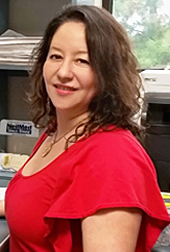USDA's Agricultural Research Service Honors Scientists of the Year
September 12, 2017
WASHINGTON, Sept. 12, 2017—For her groundbreaking work with food allergies, Agricultural Research Service (ARS) scientist Soheila J. Maleki is the agency's Distinguished Senior Research Scientist of the Year for 2017. Maleki, a research chemist at ARS' Food Processing and Sensory Quality Research Unit in New Orleans, Louisiana, is one of many ARS researchers being honored for their scientific achievements.
Maleki demonstrated outstanding leadership and research accomplishments in the field of food allergy, particularly to peanuts and tree nuts. Her accomplishments include defining the biochemical effects of processing on the immunogenicity and allergenicity of food as well as determining the molecular mechanisms involved. For example, Maleki and colleagues showed that raw peanut proteins undergo specific molecular changes during roasting that alters their allergenic properties, which created a new avenue of research in the field of food allergy.
ARS also named four 2017 Area Senior Research Scientists of the Year. They are:
- Gloria DeGrandi-Hoffman, with ARS' Honey Bee Research Unit in Tucson, Arizona (Pacific West Area), for innovative research about honey bee health and nutrition as well as her lead role in developing new pest control technologies, like HopGaurd, a product which uses beta plant acids to kill Varroa mites.
- James J. Giovannoni, with ARS' Plant, Soil and Nutrition Research Unit in Ithaca, New York (Northeast Area), for critical insight into genetic mechanisms that regulate fruit ripening, pigmentation, ethylene response and nutritional quality. Giovannoni also spear-headed the development of genetic resources allowing use of the tomato as a model crop for advanced fruit biology studies.
- Donald C. Lay, Jr., with ARS' Livestock Behavior Research Unit in West Lafayette, Indiana, (Midwest Area) for basic and applied research to improve the well-being of cattle, swine and poultry. Lay's studies about the impact of prenatal stress on offspring contributed to important insight and corrective measures. His research also identified maternal behaviors in sows that put piglets at risk of crushing.
- Steven D. Shackelford, with ARS' Meat Safety and Quality Research Unit in Clay Center, Nebraska (Plains Area), for exemplary research that has allowed the U.S. meat and livestock industry to meet the global demand for high-quality, nutritious and safe products. For example, he and colleagues developed—among other techniques—systems for objectively grading beef carcasses and boneless pork loins.
ARS is also honoring scientists who are in the early phases of their careers. The early-career awards recognize the achievements of ARS researchers with the agency for seven years or less.
This year, the top award in this category, the Herbert L. Rothbart Outstanding Early Career Research Scientist of 2017, goes to Sara J. Lupton, a research chemist at the ARS Animal Metabolism-Agricultural Chemicals Research Unit in Fargo, North Dakota (Plains Area). Lupton is internationally recognized for her research about the fate of chemical contaminants in cattle, swine and poultry as well as their waste systems and feed sources. Her contributions have informed decision-making by regulatory agencies and promoted consumer confidence in domestic milk and meat production practices.
ARS is honoring four other Area Early Career Research Scientists. They are:
- Devin A. Coleman-Derr, with ARS' Plant Gene Expression Center in Albany, California (Pacific West Area), for investigating plant epigenetics and microbial root communities with an eye towards improved stress tolerance in crops.
- Dimitre S. Mollov, with ARS' National Germplasm Resources Laboratory in Beltsville, Maryland (Northeast Area), for research on plant viruses of sugarcane, potatoes and ornamentals to help safeguard genetic resources and reduce production losses.
- Jason M. Taylor, with ARS' Water Quality and Ecology Research Unit in Oxford, Mississippi (Southeast Area), for research on denitrification in vegetated drainage ditches and their potential to remove nitrogen in runoff from agricultural lands.
- Martha M. Vaughan, with ARS' Mycotoxin Prevention and Applied Microbiology Research Unit in Peoria, Illinois (Midwest Area), for plant-defense signaling studies contributing to improved crop production and food safey, particularly from mycotoxin-producing fungi.
The agency also announced its 2017 ARS Technology Transfer Award winner. This Award recognizes individuals or groups who have done outstanding work in transferring technology to the marketplace.
This year's winner is the Soil Health Test Team at ARS' Grassland, Soil and Water Research Laboratory in Temple, Texas. The team was recognized for uncommon creativity and initiative in modernizing outdated soil testing methods and ensuring they more accurately represent biogeochemical processes that govern how plants interact with the soil and atmosphere. The new method—adopted by 15 commercial soil-testing labs worldwide—is estimated to save farmers and ranchers $20 per acre annually in nitrogen inputs alone. The team includes engineering technician Otis L. Faulkenberry, research soil scientist Richard L. Haney, and agricultural engineer Michael J. White—all with ARS, and cartographic technician Chris Holle, of the Natural Resources Conservation Service.
For more information contact Jan Suszkiw, ARS Office of Communications.
The Agricultural Research Service is the U.S. Department of Agriculture's chief scientific in-house research agency. Daily, ARS focuses on solutions to agricultural problems affecting America. Each dollar invested in agricultural research results in $20 of economic impact.

